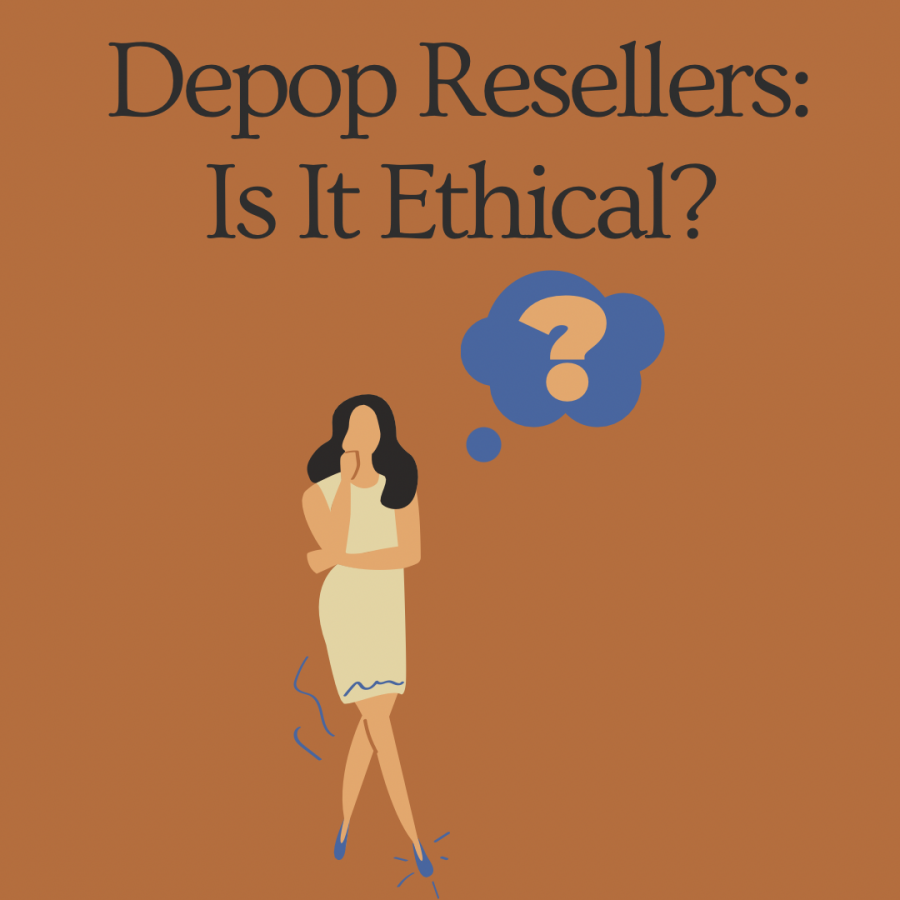Depop Resellers: Is It Ethical?
Over the last five years, buying second hand clothing has been popular. Goodwill hauls on Youtube spurred a whole generation of teenagers and adults who love to head down to their local thrift store and buy cheap, yet cute clothing.
Around this time, people became more aware of the results of buying unethically made clothes from sellers of fast-fashion–a form of fashion which relies on constantly changing trends and slave labor–and other downsides of the fashion industry. Recently, sustainable gurus popped up all over social media, teaching shopping enthusiasts of a better, more sustainable way to buy clothing.
This movement was spearheaded by online thrift stores such as Poshmark, Etsy, and Mercari. On these apps and websites, people had the ability to buy handmade, secondhand, and/or vintage clothing/accessories for cheaper prices .
One major site is Depop. It is easy to sell clothing there. You can comment as well as message the seller and the app is easy to use. Because of these traits, Depop is a flourishing selling platform that many people worldwide use.But, like with any new “trend” problems do arise.
On Twitter, tweets showcasing the unfair pricing of relatively cheap items pop up all the time. This started a discussion about Depop resellers: Is it ethical?
My definition of fashion sustainability is about being aware of the effects of one’s shopping. Instead of buying cheap fast fashion, the sustainable crowd would encourage people to shop secondhand or at sustainable brands.
There are many arguments for reselling. For instance, thrift shops throw away around 84% of its unwanted garments, sending them to landfills to rot. Of the items not sold and that don’t land in landfills, these items are shipped to poorer countries around the Globe (which unintentionally hurts the fabric industries in those countries). Depop resellers who buy in bulk at thrift stores are working against this industry problem. By reselling, these “entrepreneurs” help redistribute unwanted/second hand clothing to a new audience that are willing to pay for the items.
But, there are also reasons to dislike reselling. Buying in bulk generally takes away the good quality items from people who need to shop at thrift stores. And with that, there are arguments saying the rising popularity of thrifting and the thrifting for a profit have caused prices to rise in thrift stores. This makes cheap clothing inaccessible to poor people who must rely on thrifting.
While each argument is perfectly valid and brings up points about consumption, capitalism and the responsibility of the individual, my problem with Depop resellers takes a different route.
Depop reselling is unethical, not because reselling is unethical in general, but because of how it’s done.
Thrift stores, in the Poway area, are pretty cheap. Prices for clothing range from $3-$15. The only pricey item I’ve found is a pantsuit that cost around $20. Now imagine if someone came through and bought a pair of pants for $12, boots for $9, and then a T-shirt for $5. One would think that these items are for personal use, until the three things are spotted on Depop for $20 each. That is mine and other people’s problem with reselling on Depop. Its lax attitude towards marking thrifted items for more than what has been paid. Yes, the sellers need to make a profit, and adding an extra $5 to the price of the item to counteract the Depop Tax (a percentage of the money goes to Depop) is usually fine. What people draw the line at is outrageous pricing.
This is seen in the reselling of fast-fashion items for two times or more the price. Just like the resellers that get their items from thrift stores, this makes certain clothing unaffordable to people. When prices in thrift shops rise and Depop pricing match the ones in retail stores, some people do not have a choice but to revert back to fast fashion because it is cheaper.
But then there’s another problem; not everyone has access to a thrift store or consignment shop. Instead these people go on to Mercari or Depop to live the sustainable lifestyle and instead of facing affordable prices, they are met with ones that are upticked.
Remember, fast fashion is cheap because it doesn’t pay its workers a living wage. Fast fashion exploits workers in third world countries and are very bad quality. As the generation becomes more conscious about these horrible situations and strive to be more sustainable, all secondhand items should be affordable.
In the end, Depop reselling isn’t really an ethical issue, it’s up to the seller on how they sell items, but if we are wanting to make a change in the way fashion is consumed, they will need to reflect on how they contribute to the continued use of fast fashion. All I ask for is that Depop resellers need to be conscientious about how they’re reselling and whether or not providing affordable services.


